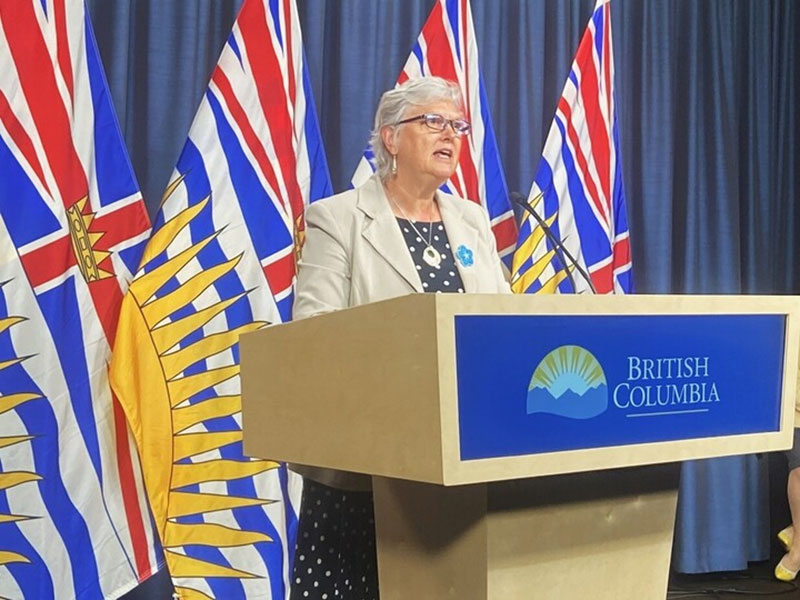The Tyee has obtained a second damning audit of a region where one Indigenous child died after horrific abuse in the care of the Ministry of Children and Family Development.
The audit, obtained under freedom of information legislation, showed an even worse compliance rate with ministry standards than an earlier audit found.
The audit found social workers failed to regularly visit children placed in foster care in all 14 files where it was required, and expressed concern over whether police and parents were notified when children went missing from care. The report notes in a redacted section about responses when children go missing that there were “no plans developed as required.”
Representative for Children and Youth Jennifer Charlesworth said the small number of cases reviewed means it may be difficult to draw conclusions about how the office functioned in October 2022, when the audit was performed.
“It is concerning to me, so I have lots of questions,” said Charlesworth. “I’m always reluctant to draw conclusions from a relatively small sample.”
The Tyee obtained the redacted copy of the special practice audit for the East Fraser service delivery area, which includes the communities of Chilliwack, Mission, Abbotsford, Langley, Agassiz and Hope.
The East Fraser service area also includes the small community east of Mission where two Indigenous siblings were abused by their foster parents, resulting in fatal injuries for an 11-year-old boy in March 2021. Indigenous children are overrepresented in B.C.’s child welfare system, making up 68 per cent of kids in government care.
The 2022 audit, which looked at 20 files, was not part of the regular MCFD auditing schedule but was done in response to the ministry’s review of a fatality. It didn’t confirm the death was the Indigenous child.
This audit reviewed one office within the ministry’s East Fraser service delivery area. It focused on the office’s handling of 20 cases between January 2019 and December 2021.
This covers the time period the two Indigenous children were placed with the foster parents who abused them.
Unlike other MCFD audits, this audit was not made publicly available.
It found failures to come close to meeting the ministry standards for ensuring children’s safety, poor training and information-sharing with caregivers, and few care plans created and updated to outline plans and goals for young people in care.
“It’s raising lots of questions for me and curiosity,” said Charlesworth, adding this audit’s findings will help inform her own office’s ongoing investigation into the fatality. A report is expected to be released next year.
“In the report it is said a number of times ‘the work may well have been done, it just wasn’t documented.’ So what we’re seeing for sure, that we know without question, was there was poor documentation,” she said.
The special audit noted that documentation was so poor that “one record had only a single note in an entire year audited.” In some of the cases, “the case tab... indicated the completion of an initial care plan, however the plan could not be found on electronic or physical records and there was also no reference to the creation of these plans.”
The audit found performance had worsened in key areas since the last regularly scheduled audit was done in May 2020. MCFD service delivery areas are audited by the ministry once every three years.
Overall compliance with MCFD policy for resource files reviewed was just 11 per cent in 2022, down from 33 per cent in 2020. MCFD workers, for example, are supposed to visit caregivers in their foster homes once every 90 days to provide support and ensure they are safe and suitable. None of the resource files showed visits with caregivers occurred within the 90-day time frame.
A review of 11 child service files found visits with children, which are also supposed to occur every 90 days, didn't happen in any of the cases. That was also identified in the 2020 audit. In the case of the abused children, no MCFD worker visited with the children at home for the seven months leading up to one child’s death.
The ministry requires initial screenings of prospective foster parents and caregivers and the other adults in their homes, including criminal record checks.
That was done in only one of three cases reviewed in the 2022 audit, compared with a 40 per cent rate in the 2020 audit. Secondary assessments of prospective caregivers and their homes before children were placed had just a 33 per cent compliance rate in 2022, compared with 56 per cent in 2020.
Ongoing caregiver education within two years of being approved to be a foster parent received a zero per cent compliance rating in 2022, down from a 15 per cent rating in 2020.
There was also no compliance with standards for sharing information with caregivers about each child in their care and their responsibilities towards them, compared with 12 per cent compliance in 2020.
None of the three resource files reviewed in 2022 showed evidence of supportive MCFD worker practices for caregivers, like listening and providing advice, responding to questions in a timely manner and meeting with caregivers in times of crisis, compared with 79 per cent compliance in 2020.
The 2022 audit looked at 11 child and youth service files, which were not examined in 2020. It found 73 per cent of kids taken into care were placed within foster homes already assessed by MCFD workers; only 27 per cent of critical incidents or injuries of kids in care reported to social workers were brought to the regional director within 24 hours; and only 18 per cent of files contained a care plan for the child created within 30 days of their entering care and updated every 12 months thereafter.
Care plan compliance is something Charlesworth always looks for in an MCFD audit. It was the subject of a report from her office in 2022.
“Children grow and change, and these circumstances shift,” Charlesworth said. “So we should always be seeing care plans, first of all, done. Done with the young person and the people in that child’s life, to the best of their ability, and that it evolves over time with the child growing.”
The 2022 audit also noted evidence of a lack of required notification to parents and the RCMP at times when children in care went missing, were lost or fled their foster care placement. Details were redacted from the documents released under FOI.
The 2022 audit looked at six family service files, three of which were closed. Only half of the files had created family plans, while just 17 per cent, one out of six files, had a family plan created within 30 days of initiating child protection services. Family plans are essential for creating a path for the family to address the child protection concerns that sparked MCFD’s involvement.
None of the three closed family service files reviewed in 2022 included a vulnerability assessment or a reunification assessment required under ministry standards. These assessments are one required step to ensure it is safe for kids and youth to move back home.
As Charlesworth told The Tyee last June, proper documentation is required to keep a record of what has been done with a family and their child in care, the plans and goals for the child and all the people who support them to ensure continuity of care, especially when there is high job turnover in an MCFD office.
Following the sentencing of the two foster parents responsible for the death of a child in their care and the abuse of another in June, Children and Family Development Minister Mitzi Dean told media an internal review of the MCFD office had taken place and the action plan for improvement had been completed. Dean later confirmed several workers in the office were no longer working with the ministry.
The 2022 audit outlines an action plan for the unnamed local service area, with deadlines set throughout November 2022.
These included visiting every child and youth in care within the next three months and establishing a visit tracking system; creating a plan to ensure case notes reflect practice and actions taken; professional development; completing screening of all caregivers and creating a tracking system to ensure it is done; and arranging training for workers on care plan development, record-keeping and what incidents to report to their director.
The individual or individuals responsible for fulfilling each action outlined in the 2022 audit were redacted.
Children and Family Development Minister Mitzi Dean told The Tyee via email that she shares “outrage about what happened to these children.”
“It is in my mind every day how the system failed these children, how they were failed at every level as the judge in this case said, including by my ministry. Proper oversight and basic social work practices were not followed,” Dean’s statement read.
Dean added MCFD took action as soon as they learned of the children’s injuries, ordering the special audit of this office and changing oversight of ministry offices all over B.C.
“New checks and levels of accountability are in place across B.C. to ensure all policies and procedures are being followed by staff, including that children and youth be seen regularly,” her emailed statement read.
“The ministry has established new positions to lead this work, including a new Associate Provincial Director of Child Welfare to lead systemic improvements to practice and oversight of practice.”
With files from Jen St. Denis.
* Story updated on Oct. 18 at 2:15 p.m. to remove the name of the community where the children were abused. ![]()
Read more: Indigenous, Rights + Justice, BC Politics


















Tyee Commenting Guidelines
Comments that violate guidelines risk being deleted, and violations may result in a temporary or permanent user ban. Maintain the spirit of good conversation to stay in the discussion and be patient with moderators. Comments are reviewed regularly but not in real time.
Do:
Do not: